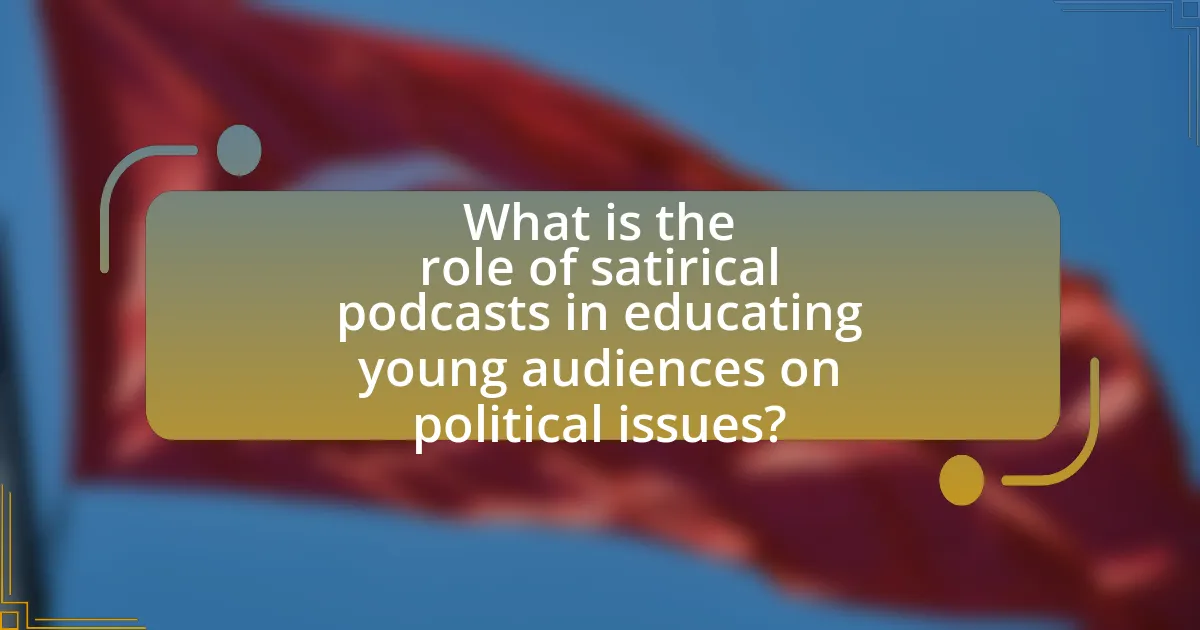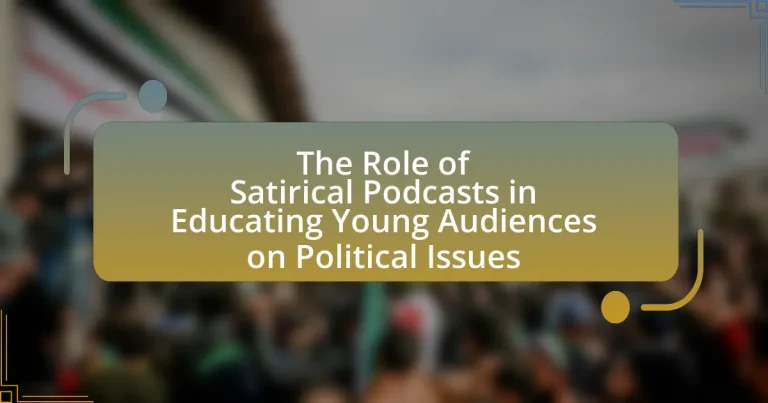Satirical podcasts serve a crucial role in educating young audiences about political issues by utilizing humor and satire to make complex topics more accessible and engaging. These podcasts enhance information retention and critical thinking, as research indicates that humor can improve audience engagement and understanding. Key techniques employed include relatable analogies, engaging storytelling, and the integration of factual information with comedic commentary. Despite challenges such as potential misinterpretation and misinformation, satirical podcasts effectively address themes like political corruption and social justice, resonating with the values of younger demographics and fostering political engagement.

What is the role of satirical podcasts in educating young audiences on political issues?
Satirical podcasts play a significant role in educating young audiences on political issues by using humor and satire to engage listeners and simplify complex topics. These podcasts often present political information in an entertaining format, making it more accessible and relatable for younger demographics who may feel alienated by traditional news media. Research indicates that humor can enhance retention of information, as seen in studies showing that audiences are more likely to remember facts presented in a comedic context. For example, a study published in the journal “Communication Research” found that humor in political messaging increases audience engagement and understanding. Thus, satirical podcasts effectively inform and educate young listeners about political matters while fostering critical thinking and discussion.
How do satirical podcasts engage young listeners with political content?
Satirical podcasts engage young listeners with political content by using humor and relatable commentary to simplify complex political issues. This approach makes the content more accessible and entertaining, which resonates with younger audiences who may find traditional news formats dry or unengaging. Research indicates that humor can enhance information retention, as seen in a study published in the journal “Communication Research,” which found that humorous content increases audience engagement and understanding. By blending entertainment with political discourse, satirical podcasts effectively capture the attention of young listeners and encourage them to think critically about political matters.
What techniques do satirical podcasts use to simplify complex political topics?
Satirical podcasts simplify complex political topics through humor, relatable analogies, and engaging storytelling. Humor allows hosts to present serious issues in a light-hearted manner, making them more accessible and less intimidating for listeners. Relatable analogies help bridge the gap between intricate political concepts and everyday experiences, enabling audiences to grasp the essence of the topics discussed. Engaging storytelling captivates listeners’ attention, fostering a deeper understanding of political narratives by framing them within compelling contexts. These techniques collectively enhance comprehension and retention of political information among young audiences.
How do humor and satire enhance the learning experience for young audiences?
Humor and satire enhance the learning experience for young audiences by making complex subjects more relatable and engaging. When humor is incorporated into educational content, it captures attention and fosters a positive emotional response, which can improve retention of information. Research indicates that humor can increase motivation and participation in learning environments, as it creates a more enjoyable atmosphere. For instance, a study published in the journal “Educational Psychology” found that students exposed to humorous content scored higher on retention tests compared to those who received traditional instruction. This suggests that humor not only aids in understanding but also encourages critical thinking by prompting audiences to analyze and question the material presented.
Why are satirical podcasts particularly effective for young audiences?
Satirical podcasts are particularly effective for young audiences because they combine humor with critical commentary, making complex political issues more accessible and engaging. This format resonates with younger listeners who often prefer entertainment-based learning methods. Research indicates that humor can enhance information retention and understanding, as seen in a study published in the journal “Communication Research,” which found that humorous content significantly improves audience engagement and recall of political messages. Additionally, satirical podcasts often address contemporary issues in a relatable manner, fostering a sense of community and shared values among young listeners, which further amplifies their impact.
What demographic factors contribute to the popularity of satirical podcasts among youth?
The popularity of satirical podcasts among youth is significantly influenced by demographic factors such as age, education level, and socio-economic status. Young individuals, particularly those aged 18 to 34, are more likely to engage with digital media, including podcasts, as they seek entertainment that resonates with their experiences and perspectives. Research indicates that this age group values humor and satire as tools for understanding complex political issues, making satirical podcasts an appealing medium. Additionally, higher education levels correlate with increased consumption of satirical content, as educated youth often seek critical commentary on current events. Furthermore, socio-economic status plays a role, as those with disposable income are more likely to invest time in leisure activities like podcast listening, which often includes satirical content that critiques societal norms and political structures.
How do young audiences perceive traditional news media compared to satirical podcasts?
Young audiences generally perceive traditional news media as less engaging and credible compared to satirical podcasts. Research indicates that younger demographics often find traditional news outlets to be biased and untrustworthy, with a 2021 Pew Research Center study showing that only 29% of adults aged 18-29 trust news from traditional media sources. In contrast, satirical podcasts, such as “The Daily Show” and “Last Week Tonight,” are viewed as more relatable and entertaining, effectively blending humor with political commentary. This format resonates with younger listeners, as evidenced by a 2020 study published in the Journal of Broadcasting & Electronic Media, which found that 63% of young adults prefer satirical content for political information due to its engaging style and perceived authenticity.
What challenges do satirical podcasts face in educating young audiences?
Satirical podcasts face significant challenges in educating young audiences due to the potential for misinterpretation of humor and satire. Young listeners may struggle to differentiate between satire and factual information, leading to confusion about political issues. Research indicates that humor can obscure serious messages, as evidenced by a study published in the Journal of Communication, which found that satirical content often results in lower retention of factual information compared to straightforward news reporting. Additionally, the rapid consumption of content on platforms like social media can limit the depth of understanding, as young audiences may only engage with snippets rather than comprehensive discussions. These factors contribute to the difficulty satirical podcasts encounter in effectively conveying educational content to younger demographics.
How can misinformation in satirical content impact audience understanding of political issues?
Misinformation in satirical content can significantly distort audience understanding of political issues by presenting false narratives as humor, leading to confusion and misinterpretation. Research indicates that audiences often struggle to differentiate between satire and factual reporting, which can result in the acceptance of misleading information as truth. For example, a study published in the journal “Political Communication” found that individuals exposed to satirical content containing misinformation were more likely to hold incorrect beliefs about political events compared to those who consumed factual news. This blending of humor and misinformation can undermine informed political discourse and skew public perception, ultimately affecting democratic engagement and decision-making.
What are the limitations of satire in conveying serious political messages?
Satire has limitations in effectively conveying serious political messages due to its inherent reliance on humor and exaggeration, which can obscure the intended message. This comedic approach may lead audiences to dismiss critical issues as trivial or not worthy of serious consideration. Additionally, satire often targets specific political figures or policies, which can alienate individuals who may not share the same views, thereby limiting its reach and impact. Research indicates that while satire can engage younger audiences, it may also reinforce existing biases rather than challenge them, as individuals tend to seek out content that aligns with their pre-existing beliefs. Consequently, the effectiveness of satire in promoting political awareness is often compromised by these factors.
How do satirical podcasts influence political engagement among young listeners?
Satirical podcasts significantly enhance political engagement among young listeners by making complex political issues more accessible and entertaining. These podcasts often use humor and satire to simplify intricate topics, which helps to capture the attention of younger audiences who may otherwise feel disconnected from traditional political discourse. Research indicates that humor can increase information retention and stimulate critical thinking, leading to a more informed and engaged listener base. For instance, a study published in the journal “Political Communication” found that exposure to satirical content correlates with increased political knowledge and participation among young adults. This suggests that satirical podcasts not only entertain but also serve as a vital tool for educating and mobilizing young listeners in the political arena.
What are the key themes addressed by satirical podcasts in political discourse?
Satirical podcasts in political discourse primarily address themes such as political corruption, social justice, media bias, and the absurdity of political events. These themes are explored through humor and irony, making complex political issues more accessible to audiences, particularly younger listeners. For instance, studies indicate that satirical content can enhance political engagement and awareness, as evidenced by the popularity of shows like “The Daily Show” and “Last Week Tonight,” which often highlight governmental failures and societal inequalities. This approach not only entertains but also encourages critical thinking about political systems and encourages listeners to question mainstream narratives.
How do these themes resonate with the values and concerns of young audiences?
Satirical podcasts resonate with the values and concerns of young audiences by addressing social justice, political engagement, and authenticity. These themes align with the increasing desire among young people for content that reflects their progressive values and encourages critical thinking about political issues. For instance, a study by the Pew Research Center found that 61% of young adults prioritize social justice, indicating a strong alignment with the themes presented in satirical podcasts. Additionally, these podcasts often utilize humor to engage listeners, making complex political topics more accessible and relatable, which is crucial for a demographic that values authenticity and connection in media.
What strategies can satirical podcasts employ to enhance their educational impact?
Satirical podcasts can enhance their educational impact by integrating factual information with humor to engage listeners effectively. This strategy allows them to present complex political issues in a relatable manner, making the content more accessible to young audiences. For instance, shows like “Last Week Tonight with John Oliver” utilize in-depth research and expert interviews to provide accurate context while delivering comedic commentary, which has been shown to increase audience retention and understanding of political topics. Additionally, incorporating interactive elements, such as listener questions or social media engagement, can further deepen the educational experience by fostering a dialogue around the issues discussed.
How can collaboration with experts improve the credibility of satirical content?
Collaboration with experts can significantly enhance the credibility of satirical content by providing factual accuracy and authoritative insights. When satirical podcasts engage experts in relevant fields, such as political science or journalism, they can ensure that the humor is grounded in reality, making the satire more impactful and trustworthy. For instance, a study by the Pew Research Center indicates that audiences are more likely to trust content that includes expert opinions, as it lends legitimacy to the information presented. This collaboration not only enriches the content but also helps to educate young audiences on complex political issues, reinforcing the satirical message with credible context.
What role does audience feedback play in shaping the content of satirical podcasts?
Audience feedback plays a crucial role in shaping the content of satirical podcasts by guiding creators on what resonates with listeners. This feedback allows podcasters to adjust their themes, humor, and topics based on audience preferences and reactions. For instance, data from surveys and social media interactions indicate that when audiences express strong opinions on specific political issues, podcasters often incorporate these topics into future episodes to maintain engagement and relevance. Additionally, audience feedback can highlight which comedic styles or formats are most effective, leading to a more tailored and impactful listening experience.
What practical tips can young audiences apply when engaging with satirical podcasts?
Young audiences can enhance their engagement with satirical podcasts by actively analyzing the content and context of the satire. This involves critically evaluating the underlying messages and the social or political issues being addressed, which can deepen their understanding of complex topics. Research indicates that satirical content often reflects real-world events and societal attitudes, making it a valuable tool for education. For instance, a study by the Pew Research Center found that 61% of young adults believe satire helps them understand political issues better. By discussing episodes with peers or on social media, young listeners can further explore different perspectives and interpretations, fostering a more comprehensive grasp of the subject matter.


